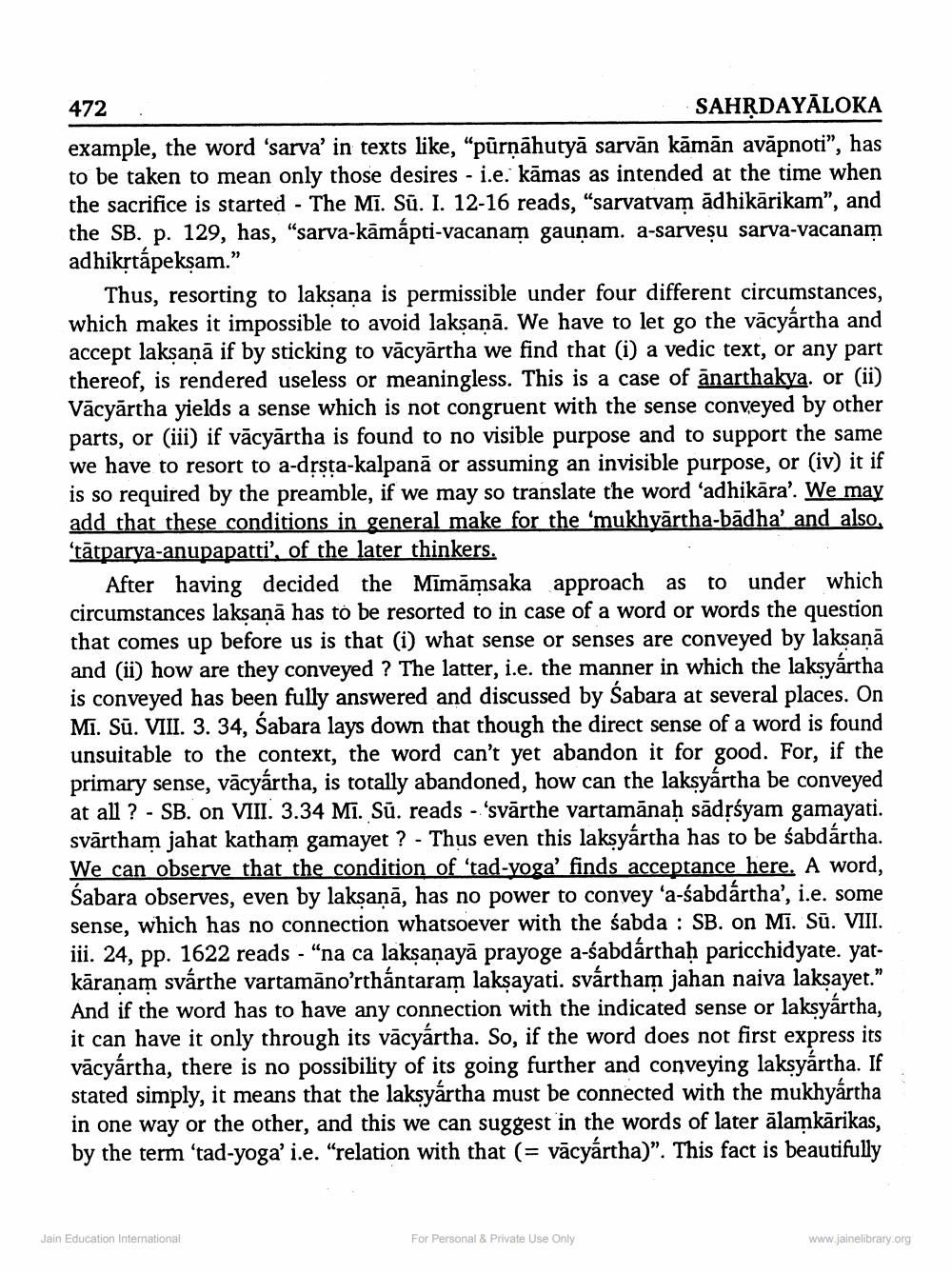________________
472
SAHṚDAYĀLOKA
example, the word 'sarva' in texts like, "pūrṇāhutyā sarvān kāmān avāpnoti", has to be taken to mean only those desires - i.e. kāmas as intended at the time when the sacrifice is started - The Mi. Su. I. 12-16 reads, "sarvatvam ādhikārikam", and the SB. p. 129, has, "sarva-kāmápti-vacanam gaunam. a-sarveșu sarva-vacanam adhikṛtápekṣam."
Thus, resorting to lakṣaṇa is permissible under four different circumstances, which makes it impossible to avoid lakṣaṇā. We have to let go the vācyártha and accept lakṣaṇā if by sticking to vācyārtha we find that (i) a vedic text, or any part thereof, is rendered useless or meaningless. This is a case of anarthakya. or (ii) Vācyārtha yields a sense which is not congruent with the sense conveyed by other parts, or (iii) if vācyārtha is found to no visible purpose and to support the same we have to resort to a-dṛṣṭa-kalpana or assuming an invisible purpose, or (iv) it if is so required by the preamble, if we may so translate the word 'adhikara'. We may add that these conditions in general make for the 'mukhyārtha-bādha' and also. 'tatparya-anupapatti', of the later thinkers.
After having decided the Mīmāmsaka approach as to under which circumstances lakṣaṇā has to be resorted to in case of a word or words the question that comes up before us is that (i) what sense or senses are conveyed by lakṣaṇā and (ii) how are they conveyed? The latter, i.e. the manner in which the lakṣyártha is conveyed has been fully answered and discussed by Sabara at several places. On MI. Sū. VIII. 3. 34, Sabara lays down that though the direct sense of a word is found unsuitable to the context, the word can't yet abandon it for good. For, if the primary sense, vācyártha, is totally abandoned, how can the laksyártha be conveyed at all? SB. on VIII. 3.34 MI. Sū. reads - 'svarthe vartamānaḥ sādṛśyam gamayati. svartham jahat katham gamayet? - Thus even this lakṣyártha has to be sabdártha. We can observe that the condition of 'tad-yoga' finds acceptance here. A word, Śabara observes, even by lakṣaṇā, has no power to convey 'a-śabdártha', i.e. some sense, which has no connection whatsoever with the sabda : SB. on Mi. Sū. VIII. iii. 24, pp. 1622 reads - "na ca lakṣaṇayā prayoge a-sabdárthaḥ paricchidyate. yatkāraṇam svårthe vartamāno'rthántaram lakṣayati. svártham jahan naiva lakṣayet." And if the word has to have any connection with the indicated sense or laksyártha, it can have it only through its vācyártha. So, if the word does not first express its vacyártha, there is no possibility of its going further and conveying lakṣyártha. If stated simply, it means that the lakṣyártha must be connected with the mukhyártha in one way or the other, and this we can suggest in the words of later alamkarikas, by the term 'tad-yoga' i.e. "relation with that (= vācyártha)". This fact is beautifully
Jain Education International
For Personal & Private Use Only
www.jainelibrary.org




